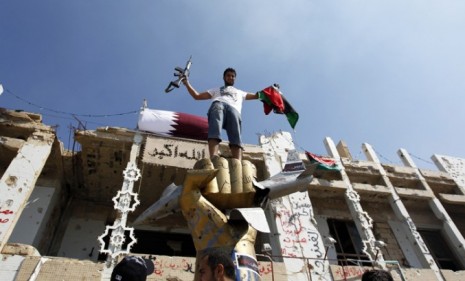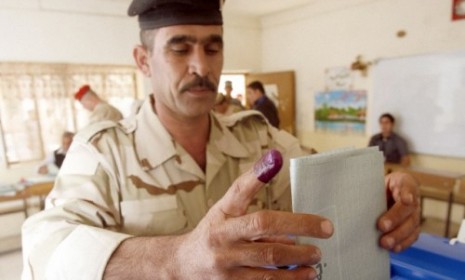3 ways the war in Libya failed
Victory is at hand for Libya's rebels. For NATO, not so much

A free daily email with the biggest news stories of the day – and the best features from TheWeek.com
You are now subscribed
Your newsletter sign-up was successful
Libyan rebels nearly seized their final battlefield victory on Wednesday, Paris Match magazine has reported (via Reuters). Commandos apparently came close to capturing Moammar Gadhafi in a raid on a Tripoli home the toppled leader was using as a hideout. Still, the rebels control much of Tripoli, and have all but won the war. And yet, the NATO-led effort to hammer Gadhafi's forces from the air has been — and continues to be — widely criticized. Here, three ways in which the mission fell short:
1. The war exposed NATO's many weaknesses
"It would be a mistake to chalk this up as a success for NATO," says Kurt Volker at Foreign Policy. In fact, it would be more accurate to say that this fight succeeded despite the confusing effort to define the mission itself, the bickering over leadership, and the crumbling of the allies' solidarity. NATO has "deep-rooted problems," and now the world knows it. So much for America's dream of really counting on Europe to share the burden of defending the world order, says The Christian Science Monitor in an editorial. Indeed, says Josef Joffe at The New Republic. "There is little evident splendor in a war which took the richest bunch of nations on earth five months to decide, just in time before the bombs ran out."
The Week
Escape your echo chamber. Get the facts behind the news, plus analysis from multiple perspectives.

Sign up for The Week's Free Newsletters
From our morning news briefing to a weekly Good News Newsletter, get the best of The Week delivered directly to your inbox.
From our morning news briefing to a weekly Good News Newsletter, get the best of The Week delivered directly to your inbox.
2. New rebel leadership might not be better than Gadhafi
It's easy to understand why people are "feeling jubilant over the downfall of Libya's tyrant," says George Jonas at Canada's National Post. But the optimism might fade fast once someone on the rebel side takes Gadhafi's place. Getting rid of "the foul Libyan colonel" won't seem like such a victory if he's replaced by "Taliban-types" who are openly hostile to the West.
3. And now the rebels are tainted by their dependence on NATO
Sure, opposition fighters have taken Tripoli, says Seumas Milne at Britain's Guardian, but everyone knows they couldn't have done it "without the 20,000 air sorties, arms supplies and logistical support of the most powerful states in the world." That "taints and undermines the legitimacy of Libya's transformation." There's a chance that Gadhafi's fall could revive the momentum of the Arab revolution, but it's more likely to send regimes the message that they can hold on unless they make Washington, London, and Paris really mad.
A free daily email with the biggest news stories of the day – and the best features from TheWeek.com
-
 How to Get to Heaven from Belfast: a ‘highly entertaining ride’
How to Get to Heaven from Belfast: a ‘highly entertaining ride’The Week Recommends Mystery-comedy from the creator of Derry Girls should be ‘your new binge-watch’
-
 The 8 best TV shows of the 1960s
The 8 best TV shows of the 1960sThe standout shows of this decade take viewers from outer space to the Wild West
-
 Microdramas are booming
Microdramas are boomingUnder the radar Scroll to watch a whole movie
-
 The Iraq war logs WikiLeaks dump: 5 revelations
The Iraq war logs WikiLeaks dump: 5 revelationsfeature The secrets-sharing site has released its massive dossier on the Iraq War, detailing unreported torture, a secret body count, and a U.S.-Iranian armed skirmish
-
 Did democracy win or lose in Iraq?
Did democracy win or lose in Iraq?feature Iraqis braved the bombs to cast their votes. But is the terror-marred election a step toward stability or chaos?